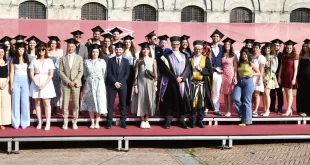Applications are invited for a PhD fellowship/scholarship at Graduate School of Natural Sciences, Aarhus University, Denmark, within the Biology programme. The position is available from February 2024 or later.
Title:
Biochemistry of archaeal alkane oxidation
Research area and project description:
The Research Group Archaea within the Department of Biology – Microbiology, investigates the ecophysiology and metabolism of deep-sea Archaea catalyzing the anaerobic oxidation of volatile alkanes like ethane, propane, and butane. Volatile alkanes are major constituents of natural gas with a major impact on carbon and energetic budgets of deep-sea marine sediments. Within this project we aim to understand the biochemical mechanism of alkane functionalization and further downstream processing into central metabolic pathways, along with the associated genes and enzymes. To achieve these objectives, the candidate will conduct physiology assays, incubations with stable isotope labeled substrates and precursors, and comparative metabolomics. Experiments will be done with cultures, concentrated cell suspensions, and cell extracts. Metabolomics analyses will be complemented by comparative genomics and proteomics for metabolic pathway reconstruction. We expect to uncover unprecedented biochemical reactions, to identify novel enzymes and genes, and to consolidate our understanding of archaeal alkane oxidation pathways, with further implications in metabolic pathways evolution.
For technical reasons, you must upload a project description. When – as here – you apply for a specific project, please simply copy the project description above, and upload it as a PDF in the application. If you wish to, you can indicate an URL where further information can be found.
Qualifications and specific competences:
Applicants to the PhD position must have a relevant MSc degree in biology, biochemistry, microbiology or equivalent and have graduated before the application deadline.
We expect the applicants to
- Have a strong background in one of the following research fields: microbiology, molecular biology, biochemistry, microbial ecology, biogeochemistry, or other relevant research areas
- Have excellent collaborative skills, strong potential to publish at a high international level, excellent command of English, and an interest to join an interdisciplinary team. International applicants who do not have English as their first language must prove excellent English language writing skills and fluency.
Place of employment and place of work:
The place of employment is Aarhus University, and the place of work is Ny Munkegade 114, DK-8000 Aarhus C, Denmark.
Contacts:
Applicants seeking further information for this project are invited to contact: Associate Professor Florin Musat, florin.musat@bio.au.dk or Associate Professor Niculina Musat, niculina.musat@bio.au.dk
How to apply:
For information about application requirements and mandatory attachments, please see the Application guide. Please read the Application guide thoroughly before applying.
- Choose August 2023 Call with deadline 1 November 2023 at 23:59 CET.
- You will be directed to the call and must choose the programme “Biology”.
- In the boxed named “Study”: In the dropdown menu, please choose: “Biochemistry of archaeal alkane oxidation (Biaalo)”
Please note:
- The programme committee may request further information or invite the applicant to attend an interview.
Aarhus University’s ambition is to be an attractive and inspiring workplace for all and to foster a culture in which each individual has opportunities to thrive, achieve and develop. We view equality and diversity as assets, and we welcome all applicants. All interested candidates are encouraged to apply, regardless of their personal background.
Job Features
| Job Category | Doctorat |
 medjouel.com Study Non Stop
medjouel.com Study Non Stop



